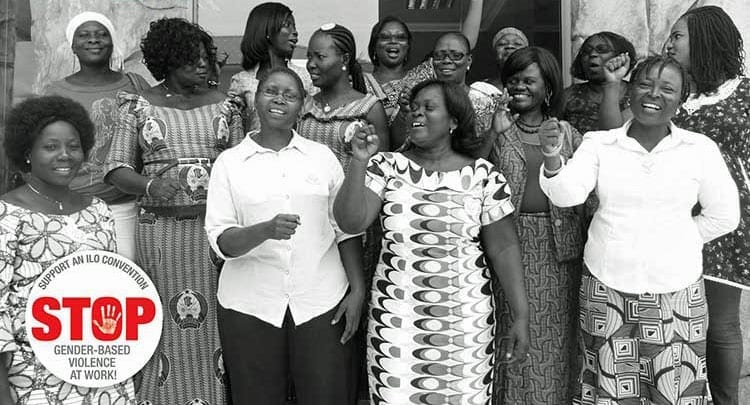
Aug 3, 2017
No global data document gender-based violence at work. But across the board, gender-based violence remains one of the most tolerated violations of workers’ human rights. Some 35 percent of women over age 15—818 million women globally—have experienced sexual or physical violence at home, in their communities or in the workplace.
The Solidarity Center and allies throughout the international labor, human and women’s rights communities are campaigning for an International Labor Organization (ILO) convention to stop violence and harassment at work. As part of the process, begun many months ago, the International Trade Union Confederation (ITUC) is now spearheading efforts to lobby governments and employer organizations around the world for their input and support. (The ITUC campaign toolkit includes talking points, resources and tips for lobbying your government.)
Allies are building awareness for passage of a convention and distributing an ILO questionnaire to their government representatives soliciting comments and support in advance of a September 22 deadline. When ILO member states ratify a convention, they commit to applying it in national law and practice, and complaints can be made against countries for violations. In June 2018, the ILO International Labor Conference (ILC) will take up the issue.
Gender-Based Violence: Worse Without Freedom to Form Unions
Domestic workers, whose isolation in employer homes makes them especially vulnerable to abuse, are strongly championing its passage. Building on the tactics of their successful global campaign for the 2011 ratification of ILO Convention 189 covering domestic workers—the last convention the ILO passed—they are reproducing those steps to ensure support for a convention to end gender-based violence at work, says Elizabeth Tang, general secretary of the International Domestic Workers Federation (IDWF).
“Gender-based violence is always worse when there is no freedom of association,” Solidarity Center Policy Director Molly McCoy said earlier this year. “When workers are not organized (in unions), they don’t have resources to tackle gender-based violence.” McCoy moderated a Solidarity Center panel in New York on gender-based violence at work in conjunction with the United Nations Commission on the Status of Women meetings.
Gender-Based Violence Includes Physical, Mental Abuse
In a detailed report issued in advance of the 2018 ILO conference, the ILO describes gender-based violence as affecting both women and men, but notes that unequal status and power relations in society and at work often result in women being far more exposed to violence and harassment, which can be physical, psychological and sexual.
In addition, the ILO uses the term “world of work” for a proposed convention, because gender-based violence occurs not only in the physical workplace, but during the work commute, at work-related social events, in public spaces—the primary venue for informal workers such as street vendors—and in the home, in particular for domestic workers and teleworkers.
Addressing violence and harassment through an international standard is key to the objectives of achieving decent work for all and addressing gender inequality in the UN’s 2030 Agenda for Sustainable Development (Goal 8 and Goal 5). A new standard would be preventative, by addressing negative societal and workplace cultures, and “should also be able to respond to the new challenges and risks which might lead to violence and harassment in the world of work, such as those arising from changing forms of work and technology,” according to an October 2016 report by the UN Meeting of Experts on Violence against Women and Men in the World of Work.
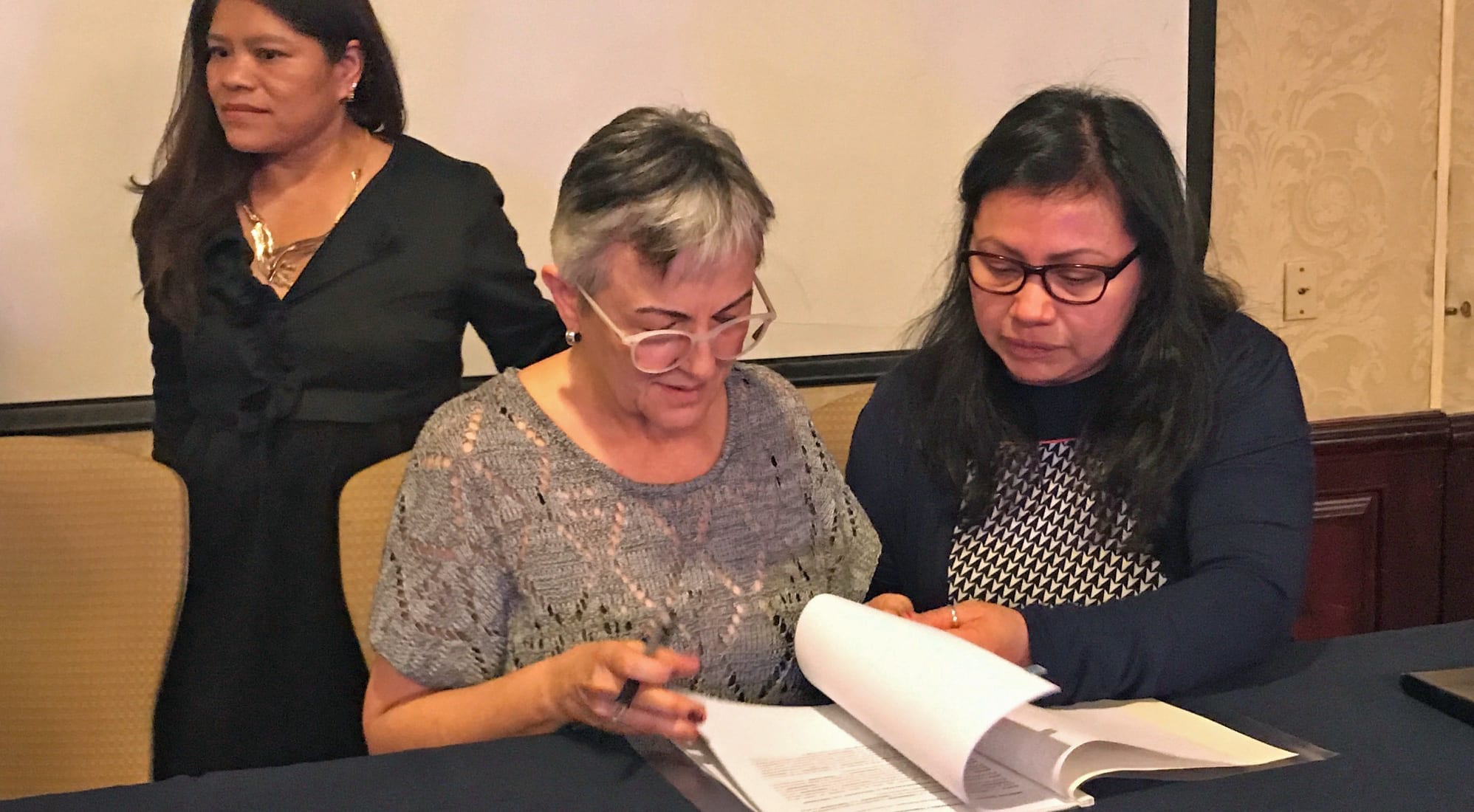
Jul 27, 2017
The Mexican domestic workers union, SINACTRAHO, last week launched a far-reaching campaign to ensure domestic workers across Mexico are covered by employment contracts.
“Our goal is to have 10,000 workers sign a formal contract with their employers, in time for December holidays,” says Marcelina Bautista, SINACTRAHO co-president.
“Trabajo Digno por Ti, por Mi y todas Mis Compañeras” (“Decent Work for You, for Me, and all My Sisters”) also is gaining unlikely support—from employers.
“This is not an act of kindess, this is an action of responsibility,” says Maite Azuela, speaking on behalf of “Hogar Justo Hogar” (Home, Just Home), a group of employers that aims to work jointly with workers to improve rights and labor conditions.
“The unjust conditions that exist in our country and in our workplaces, we as employers too often replicate at home,” she says. “Building the country that we truly want is work that begins at home.”
During the campaign launch June 23, which coincided with Mexico’s annual day to celebrate domestic work, the union presented two model contracts, one for domestic workers who labor full time for an employer, and another for part-time workers. The contracts include a calculation sheet to determine proper accrual and payment of benefits afforded to workers under law.
“I appreciate Marcelina´s work and support, and all the people here, because I am beginning to understand that there are people who support us,” says SINACTRAHO member Yazmin Méndez.
“I know that we can change the situation that we as workers live. Our work is the same as another job, we have rights and resposibilities.”
SINACTRAHO was founded two years ago and has since grown to some 900 members nationwide. The struggle by Mexico’s domestic workers for rights on the job is documented in the film, “Day Off” (Día de Descanso), in which SINACTRAHO executive board members take part.
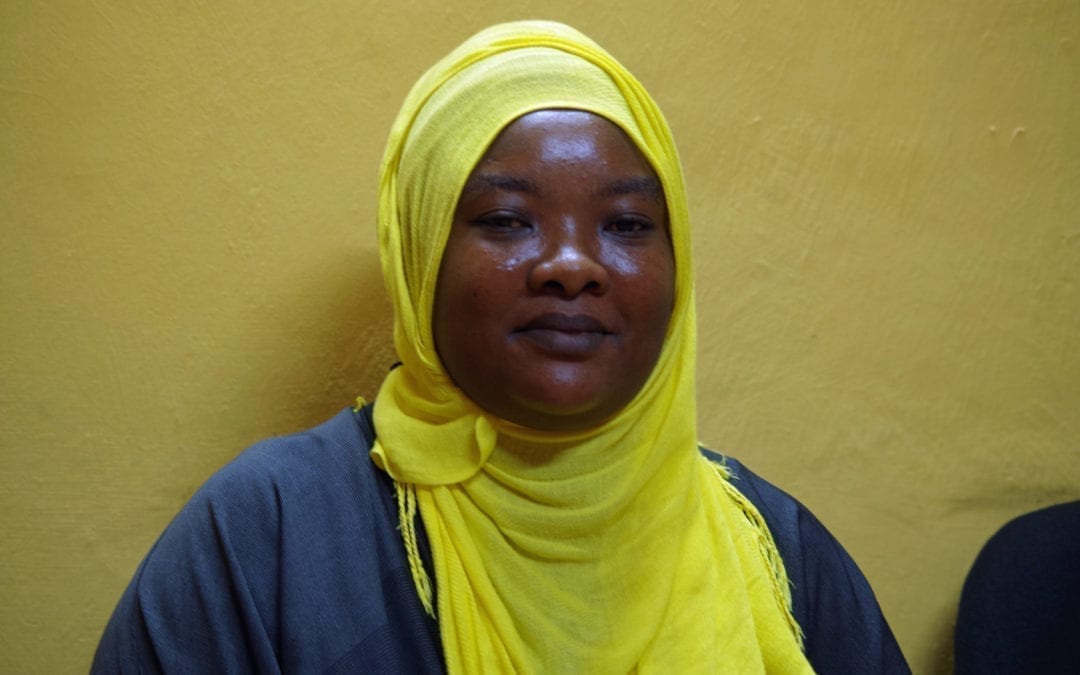
Jul 27, 2017
In Mombasa, the labor broker’s announcement that jobs were available in Saudi Arabia resonated with Maria Makori Mwentenje.
“We were very poor. We had two children,” (age 10 and 1), Makori says, describing why she and her husband agreed that she should seek work in the Saudi Arabia. “We tried a small business and selling food, but that didn’t work. And there were no casual jobs available. We were hustling every day, but some days there was not enough to feed the family.”
Makori signed up with the labor broker but was not given a contract nor told her duties. Only at the airport did she learned she would be paid 18,000 Kenya shillings ($172) a month rather than the 23,000 ($221) she was promised. But even at that rate, she had to take a chance—it was not possible to earn that much in Kenya. She boarded the plane.
When she arrived in Saudi Arabia, she and other women traveling for work were taken to a room where their passports and travel documents were confiscated. Under the kefala system in Arab Gulf countries, migrant workers are tied to one employer, and it is illegal for them to get another job in the country. To ensure they do not leave, employers typically take their passports and often their mobile phones.
In Saudi Arabia, Makori was required to care for four children, including a baby. Working around the clock, her employer expected her to wake at all hours of the night to tend to the baby and still rise at 6 a.m. to prepare the family’s breakfast and get the children ready for school.
During her last pregnancy, Makori had developed hypertension, and in Saudi Arabia, the long hours, stress and difficult tasks exacerbated her condition. She experienced frequent headaches, and her body started to swell. Rather than take her to a doctor, her employer forced her to take pills, and she did not know what they were.
She was sexually harassed from the time she first walked into the employer’s house. When she contacted her husband and told him about the abuse, her husband went to the labor broker and asked why he sent his wife to such an employer. Rather than take steps to ensure Makori’s safety, the labor broker verbally abused her husband.
At one point, when she was too ill and tired to work, she told her employer she needed to rest. Enraged, the employer’s daughter entered the tiny space where Makori slept and after screaming at her, threw an iron at Makori, barely missing her head.
Fearing for her life, Makori fled to the police, where she was fortunate to encounter an officer who forced the family to return her passport and gave her money to travel. Unpaid for six months of work, she was grateful to return home with her life.
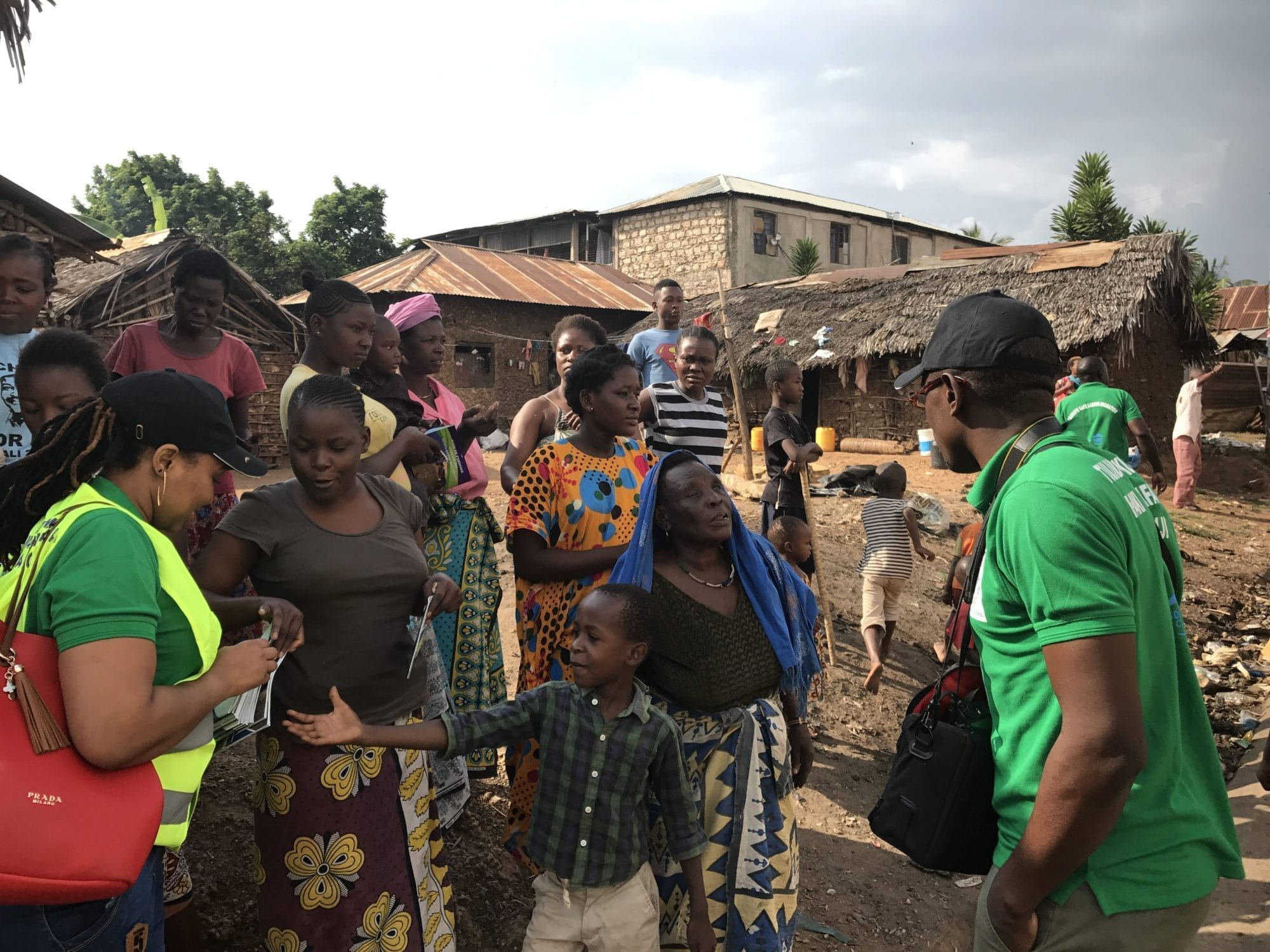
Jul 24, 2017
Some 200 people from the Kisauni neighborhood in Mombasa, Kenya, took part in a forum on migrant worker rights Saturday, where those who had gone abroad for work described the harsh conditions they endured and how the labor brokers who signed them up often lied about the wages they would receive and the type of work they would do.
The July 22 forum was the second in a series sponsored by long-time Solidarity Center partner, the Kenya Union of Domestic, Hotel, Educational Institutions, Hospitals and Allied Workers (KUDHEIHA), and two local migrant worker and anti-human trafficking organizations, TRACE Kenya, Haki Africa and the Kenya National Commission on Human Rights.
In Kenya, where 2.5 million people toil in irregular, precarious jobs compared with 900,000 in the formal sector, many workers are unable to support their families and so become targets for the labor brokers who haunt villages, towns and cities.

KUDHEIHA organizers went door to door to encourage Mvita residents to attend the forum on migrant worker rights. Credit: Solidarity Center/Deddeh Tulay
Unscrupulous labor brokers will promise higher wages than what workers will be paid, describe working conditions far less grueling than reality, and do not show workers their contracts until they are at the airport or bus station. Frequently, the contracts are written in Arabic or a language the workers cannot understand, and the contracts may even change after they arrive at their destinations.
Although many workers in and around the Mombasa area travel abroad for jobs, primarily to Arab Gulf countries, customs or embarrassment may prevent them from sharing their experiences, and many residents do not have access to credible information on migration. As a result, communities are unaware of the hazards involved in migrating for work, says KUDHEIHA Organizing Secretary Teresa Wabuko.
“Village elders are shocked at how many people from their area have left for work. Information is important to convey to them so they understand the problem,” says Wabuko.
KUDHEIHA, which has long organized domestic workers throughout Kenya and has won national legislation improving domestic workers’ wages, benefits and working conditions, recently launched the campaign in Mombasa to reach domestic workers before they migrate and after they return.
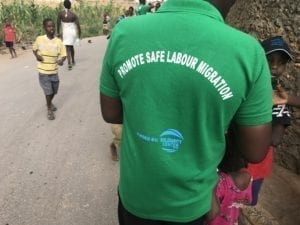
Credit; Solidarity Center/Deddeh Tulay
In setting up the forums, KUDHEIHA met with village elders, youth and local government officials. The village elders and other grassroots leaders took ownership of the programs, assisting in mobilizing their communities and speaking at the forums.
“These are issues affecting their sisters, these are issues affecting their brothers, their family,” says Wabuko. “To learn from them the best way to carry out the whole exercise successfully.”
Before the event, KUDHEIHA organizers went door to door to provide people with information about the forum and invite them to join.
“Accomplishing gains for domestic workers [in Kenya] seemed impossible, but it was done,” says Livingstone Abukho, KUDHEIHA Mombasa chairman. “Therefore, it can be done for migrant workers.”
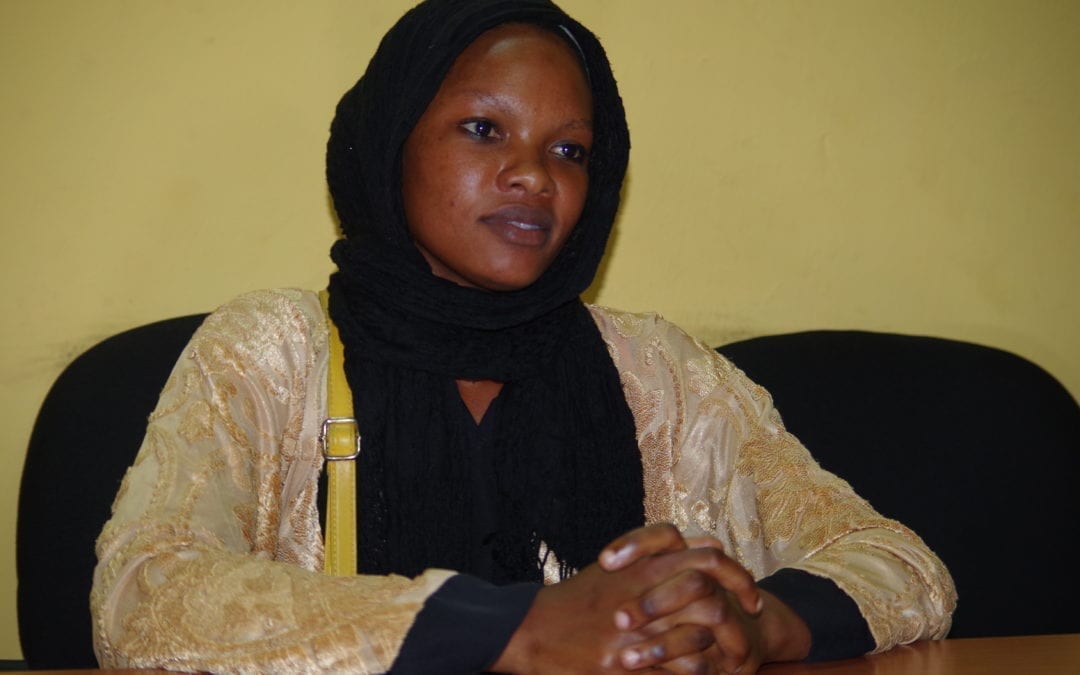
Jul 20, 2017
When Mwahamisi Josiah Makori arrived in Saudi Arabia in 2014 at the home of her employer, she was given 20 minutes to rest before beginning her duties as a domestic worker. Her employers held their noses when they greeted her and made her shower outside before allowing her in the house.
Her responsibilities involved cleaning two homes, including that of the employer’s mother-in-law. She was required to take care of the children, and when they spit on her, her employer told her not to complain. She was up all night caring for the baby and by 6 a.m., preparing the family’s breakfast.
She was given a torn, dirty mat to sleep on, and when she requested a new mat, her employer refused, telling her she was only there for work. In the middle of her tasks, she was required to stop and flush the toilet after a family member used the bathroom.
Makori was required to hold the baby throughout the day as she cooked, cleaned and cared for the other children. One afternoon, when she put the baby down to store groceries, the baby crawled to a cabinet. Alarmed, she called out. Her employer began beating her, saying she was making the baby nervous. They took her to the police authorities and told them she slept all day and refused to work.
She finally was able to convince the police of her plight, and an officer told her employer to pay her way home. The employer refused, but the employer’s mother-in-law paid her way to Kenya.
In Kenya, Makori had struggled to support her three children as a single mother. She was desperate for paid employment when her best friend introduced her to a labor broker who was traveling from village to village. Makori could not afford to pay her children’s school fees, and says she felt she had no choice but to leave the country for work.
After three months of nearly non-stop labor in Saudi Arabia, Makori returned to Kenya. Without pay.







